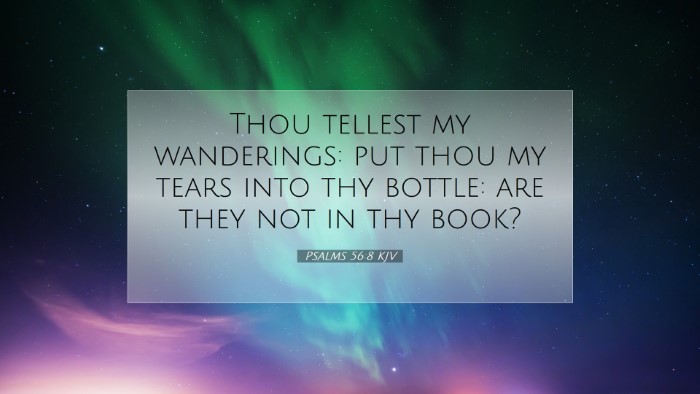Psalms 56:8 Commentary
Bible Verse: "You keep track of all my sorrows. You have collected all my tears in your bottle. You have recorded each one in your book." (Psalms 56:8, NLT)
Understanding the Context
The Book of Psalms is a profound collection of hymns, prayers, and poetic expressions reflecting the depths of human emotion in relation to God. Psalm 56, attributed to David, reveals his lament and plea for help during a time of distress, particularly when he was captured by the Philistines in Gath. It exhibits themes of fear, trust, and divine care that resonate deeply with believers navigating trials.
Summary of Insights from Public Domain Commentaries
Matthew Henry's Commentary
In his exploration of Psalms 56:8, Matthew Henry emphasizes the comforting nature of God's remembrance of our troubles. He notes that God's awareness of our sorrows implies a personal relationship; the Lord does not overlook any aspect of our pain. Henry draws attention to the imagery of God collecting tears in a bottle, which conveys a message of attentiveness and compassion.
- Divine Attention: Each tear represents an individual sorrow, providing a deeply personal connection and affirming that God engages with our emotional states.
- Covenant Relationship: The idea that God records our tears in His book highlights the trustworthiness of His promises and the care He extends to His people.
Albert Barnes' Notes on the Bible
Albert Barnes aligns with Henry's interpretation but delves deeper into the symbolic nature of the 'bottle' and 'book.' He explains that these metaphors signify God's intimate concern and watchfulness over our lives. Barnes articulates how these symbols communicate that God is aware of both our public and private sufferings.
- Symbolic Meaning: The bottle is a representation of preservation. Just as one collects tears, God ensures that our afflictions are not wasted or forgotten.
- Assurance of Justice: The recording of our woes serves as a promise of eventual justice and vindication that God will act upon in due time.
Adam Clarke's Commentary
Adam Clarke provides an insightful reflection on the cultural and historical aspects of tear collection, noting that in ancient times, tears were often seen as a sacred resource. Clarke points out that God’s collection of these tears indicates His willingness to share in our sufferings and to comprehend the gravity of our trials.
- Cultural Context: The customs surrounding the collection of tears reflect a broader understanding of grief and its sacred nature, underscoring God's empathetic nature.
- Encouragement: For Clarke, the message of God’s attention brings hope; it assures believers that their suffering serves a purpose in God’s overarching plan.
Theological Reflections
Psalms 56:8 can be viewed through several theological lenses, offering rich insights for pastors, students, and scholars alike.
- Sovereignty of God: This verse reflects the sovereignty of God in managing the universe while simultaneously being intricately involved in the minutiae of human suffering.
- Immanence and Transcendence: God’s ability to store tears in a bottle demonstrates His immanent presence in human experiences, while His overarching knowledge affirms His transcendence above those experiences.
- Hope in Suffering: Believers can draw comfort from the promise that their sadness is recorded, instilling hope through the assurance of God’s eventual resolution of their struggles.
Practical Applications
As one reflects on Psalms 56:8, several practical applications emerge that can guide individual responses to grief and tribulation:
- Embrace Vulnerability: Encourage individuals to express their emotions, understanding that vulnerability before God is both acceptable and healing.
- Seek Community: Highlight the importance of community support among believers, allowing them to share in each other's sorrows.
- Prayer as an Outlet: Promote prayer as a means of communication with God, where individuals can bring their fears, sorrows, and tears, knowing they are heard.
Conclusion
Psalms 56:8 profoundly captures the divine attentiveness and care that God extends toward His children, especially in times of distress. The collective insights from Matthew Henry, Albert Barnes, and Adam Clarke illuminate a rich tapestry of meaning, encouraging individuals to find solace in God’s promise that their suffering is not overlooked. Through understanding these themes, believers can navigate their trials with a renewed sense of hope and assurance of God’s presence in every tear shed.


